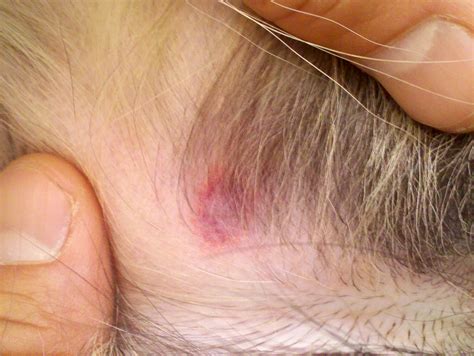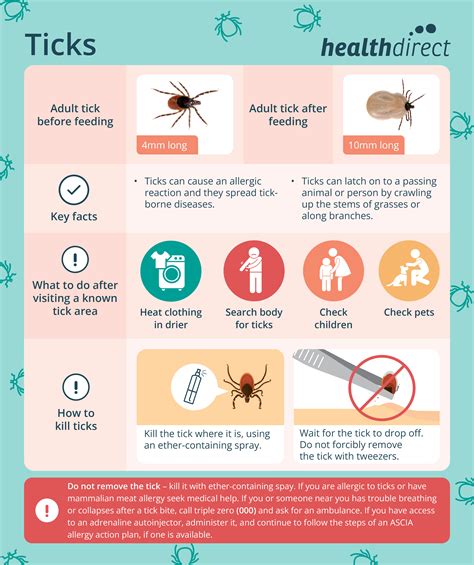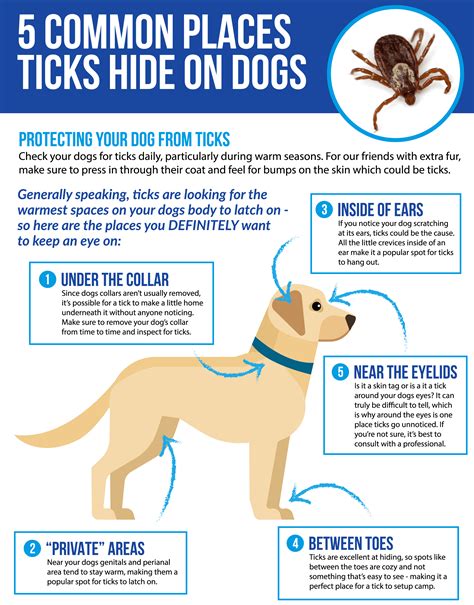Dog symptoms tick bite can range from mild irritation to serious diseases. Learn how to spot the signs and keep your furry friend safe.
If you're a dog owner, you know how important it is to keep your furry friend healthy and happy. Unfortunately, dogs are susceptible to a variety of health issues, including tick bites. These pesky parasites can cause a range of symptoms in dogs, from mild irritation to serious illness. Therefore, it's essential to know the signs of tick bites and how to treat them effectively.
Firstly, it's vital to understand that ticks are small, blood-sucking insects that attach themselves to animals and humans. Once they latch on, they can transmit various diseases and infections through their bite. Dogs are particularly vulnerable to tick bites, as they often spend time outdoors in areas where ticks are prevalent.
Furthermore, recognizing the symptoms of a tick bite is crucial for prompt treatment. Some common signs include fever, loss of appetite, lethargy, and swelling around the bite area. If left untreated, these symptoms can escalate to more severe conditions like Lyme disease or Rocky Mountain spotted fever.
Therefore, it's essential to take preventive measures such as using tick repellents and checking your dog for ticks regularly. In case you notice any symptoms of a tick bite, it's best to consult your veterinarian immediately. Quick action can ensure that your furry friend receives the necessary treatment and recovers quickly.
In conclusion, being aware of the symptoms of tick bites and taking preventive measures can go a long way in keeping your furry friend healthy and happy. As a responsible pet owner, it's crucial to stay vigilant and informed about your dog's health.
Introduction

Dogs are playful and curious animals that like to explore everything around them. However, during their explorations, they can encounter ticks, which can cause serious health problems if left untreated. Ticks are blood-sucking parasites that attach themselves to a dog's skin, feeding on its blood and transmitting diseases in the process. Therefore, it is essential to be aware of the symptoms of tick bites in dogs to prevent complications.
Signs of Tick Bites

The first sign of a tick bite in dogs is usually intense scratching or biting at the site of the bite. Dogs may also experience redness, inflammation, and swelling around the tick bite. As the tick feeds on the dog's blood, it may become engorged, making it easier to spot on the skin. Additionally, dogs may develop a fever, lethargy, and loss of appetite as a result of a tick bite.
Tick-Borne Diseases

Ticks can transmit several diseases to dogs through their bite, including Lyme disease, Anaplasmosis, Ehrlichiosis, and Rocky Mountain spotted fever. These diseases can cause a range of symptoms, including lameness, joint pain, fatigue, and muscle weakness. If left untreated, these diseases can be life-threatening to dogs.
Prevention of Tick Bites

The best way to prevent tick bites in dogs is to use tick prevention products such as tick collars, spot-on treatments, and oral medications. It is also essential to check your dog for ticks regularly, especially after spending time outside in wooded or grassy areas. You can use a specially designed tick removal tool to remove ticks from your dog's skin safely.
Treatment of Tick Bites

If you suspect that your dog has a tick bite, it is crucial to remove the tick as soon as possible. You can do this by using a tick removal tool or taking your dog to the vet. Once the tick is removed, clean the bite site with antiseptic solution to prevent infection. If your dog shows any signs of tick-borne disease, such as lethargy or loss of appetite, take them to the vet immediately.
Conclusion

Tick bites in dogs can be a serious health concern, as they can transmit diseases that can be fatal if left untreated. Therefore, it is essential to be aware of the signs of tick bites in dogs, including intense scratching or biting at the site of the bite, redness, inflammation, and swelling. To prevent tick bites, use tick prevention products and check your dog regularly for ticks. If you suspect that your dog has a tick bite or tick-borne disease, take them to the vet immediately. Remember, prevention is always better than cure when it comes to tick bites in dogs.Understanding the Different Stages of Tick-Borne Diseases in Dogs: From Initial Symptoms to Chronic ComplicationsTicks are notorious carriers of diseases that can affect both humans and animals. Dogs are particularly susceptible to tick bites, which can cause a range of symptoms and complications. Understanding the different stages of tick-borne diseases in dogs is crucial for pet owners, as early detection and treatment can prevent serious health problems down the line.Recognizing the Signs of Tick Bites on Dogs: From Skin Irritation to Fever and FatigueTick bites on dogs can manifest in various ways, depending on the type of tick and the severity of the bite. Common signs include skin irritation, redness, swelling, and itching around the bite site. In some cases, dogs may develop a fever, lethargy, and loss of appetite. It's important for pet owners to monitor their dogs closely for any signs of tick bites, as prompt treatment can prevent the spread of disease.Diagnosing Tick-Borne Illnesses in Dogs: When to Seek Veterinary Care and TestingIf your dog shows signs of tick bites or tick-borne illnesses, it's important to seek veterinary care right away. A veterinarian can perform tests to diagnose the specific disease and recommend appropriate treatment options. Some tick-borne illnesses, such as Lyme disease, can be difficult to diagnose due to the variety of symptoms they present. That's why it's crucial to work with a qualified veterinarian who can provide accurate testing and diagnosis.Monitoring Your Dog's Health After a Tick Bite: Tips for Prevention and Early InterventionPreventing tick bites in the first place is the best way to protect your dog from tick-borne illnesses. This can be done through regular use of tick control products, avoiding areas where ticks are prevalent, and checking your dog for ticks after outdoor activities. If your dog does get bitten by a tick, it's important to monitor their health closely for any signs of illness. Early intervention can prevent the spread of disease and improve your dog's chances of a full recovery.Identifying the Types of Ticks That Can Affect Dogs: Differences in Symptoms and TransmissionNot all ticks are created equal when it comes to their impact on dogs. Different types of ticks can cause different symptoms and transmit different diseases. For example, the American dog tick is known to transmit Rocky Mountain spotted fever, while the black-legged tick is the primary carrier of Lyme disease. Understanding the types of ticks that can affect your dog can help you better protect them from potential illness.Assessing the Severity of Tick-Borne Symptoms in Dogs: When to Consider Emergency CareTick-borne illnesses can range from mild to severe, depending on the type of disease and how quickly it's diagnosed and treated. In some cases, tick bites can cause life-threatening complications such as paralysis or organ failure. If your dog shows signs of severe symptoms such as difficulty breathing, seizures, or loss of consciousness, it's important to seek emergency veterinary care right away.Preventative Measures for Tick Bites in Dogs: Vaccines, Tick Control Products, and MonitoringPreventing tick bites in the first place is the best way to protect your dog from tick-borne illnesses. This can be done through regular use of tick control products, vaccinations, and monitoring your dog for any signs of tick bites or illness. Tick control products such as collars, sprays, and topical treatments can be highly effective at preventing tick bites and reducing the risk of disease transmission.Natural Remedies for Tick Bites in Dogs: Herbs, Essential Oils, and Homeopathic TreatmentsIn addition to traditional veterinary treatments, there are also natural remedies that can be used to treat tick bites in dogs. Herbs such as calendula and chamomile can help soothe irritated skin, while essential oils such as lavender and peppermint can repel ticks and soothe inflammation. Homeopathic treatments such as Ledum and Apis can also be effective in reducing swelling and pain associated with tick bites.Potential Long-Term Effects of Tick-Borne Diseases in Dogs: Chronic Pain, Organ Damage, and MoreTick-borne illnesses can have long-term effects on a dog's health, even after the initial symptoms have been treated. Some dogs may experience chronic pain, organ damage, or neurological problems as a result of tick-borne diseases. It's important for pet owners to be aware of these potential complications and work closely with their veterinarian to ensure their dog receives appropriate follow-up care.Supporting Your Dog's Recovery from Tick-Borne Illness: Nutrition, Exercise, and Follow-Up CareAfter treatment for tick-borne illnesses, it's important to support your dog's recovery through proper nutrition, exercise, and follow-up care. A balanced diet rich in nutrients can help boost your dog's immune system and promote healing. Regular exercise can also help improve your dog's overall health and wellbeing. And regular follow-up care with your veterinarian can help ensure that any potential long-term effects of tick-borne illnesses are identified and addressed promptly.
As a veterinary expert, it is important to educate pet owners about the symptoms of tick bites in dogs.
Pros of knowing dog symptoms tick bite:
- Early detection can prevent serious health issues.
- Timely treatment can save your pet from unnecessary suffering and discomfort.
- Preventing tick bites can also prevent the spread of diseases carried by ticks.
Cons of ignoring dog symptoms tick bite:
- Untreated tick bites can result in serious infections, such as Lyme disease, Ehrlichiosis and Anaplasmosis.
- Long-term complications such as joint pain, kidney disease, and neurological damage can occur if tick bites are left untreated.
- Tick bites can also cause allergic reactions in some dogs, leading to swelling and difficulty breathing.
The following are common symptoms of tick bites in dogs:
- Localized redness and swelling: The area surrounding the tick bite may become inflamed, red, and swollen.
- Itching and irritation: Your dog may scratch and lick the area repeatedly due to itching and irritation.
- Fever and lethargy: Tick bites can cause fever and lethargy in dogs. If your pet is showing signs of fatigue or weakness, seek veterinary attention immediately.
- Loss of appetite: Tick bites can cause loss of appetite and weight loss in dogs.
- Lameness: In some cases, tick bites can lead to joint pain and lameness in dogs.
- Paralysis: In severe cases, tick bites can cause paralysis in dogs. Paralysis typically starts in the hind legs and can spread throughout the body.
If you notice any of these symptoms in your dog after a tick bite, it is important to seek veterinary attention immediately. Your veterinarian may recommend antibiotics to treat infections or medications to manage symptoms.
As a pet owner, it is important to keep an eye out for any symptoms of tick bites on your furry friend. Tick bites can cause serious health problems if left untreated, and it is crucial to seek veterinary care immediately if you suspect that your dog has been bitten by a tick.
One of the most common symptoms of tick bites in dogs is a fever. A fever is a sign that your dog's immune system is working hard to fight off the bacteria or infection that may have been transmitted by the tick. Other symptoms of tick bites can include lethargy, loss of appetite, vomiting, and swollen lymph nodes.
If you suspect that your dog has been bitten by a tick, it is important to carefully examine your pet's skin for any signs of a tick bite. Look for a small, raised bump on your dog's skin, which may be accompanied by redness or irritation. If you find a tick, it is important to remove it immediately using a pair of tweezers or a tick removal tool.
In conclusion, tick bites can be a serious health concern for dogs, and it is important to keep a close eye on your pet for any signs of tick bites. If you suspect that your dog has been bitten by a tick, seek veterinary care right away to ensure that your pet receives the proper treatment and care to prevent any serious health complications.
People also ask about Dog Symptoms Tick Bite:
- What are the symptoms of tick bites on dogs?
- Some common symptoms of tick bites on dogs include:
- Fever
- Loss of appetite
- Lethargy
- Joint pain and swelling
- Itching or scratching at the bite site
- Inflammation or redness around the bite area
- Paralysis (in severe cases)
- How long does it take for symptoms of a tick bite to show in dogs?
- The symptoms of a tick bite can vary depending on the type of tick and the dog's immune response. Some symptoms may appear within a few hours, while others may take several days to show up.
- What should I do if my dog has a tick bite?
- If you find a tick on your dog, remove it immediately using tweezers or a tick removal tool. Clean the bite area with antiseptic and keep an eye on your dog for any signs of infection or illness.
- Can a tick bite make a dog sick?
- Yes, tick bites can transmit diseases such as Lyme disease, Rocky Mountain spotted fever, and ehrlichiosis, which can make dogs very sick. It is important to check your dog for ticks regularly and remove them promptly to reduce the risk of tick-borne illnesses.
- How can I prevent tick bites on my dog?
- You can prevent tick bites on your dog by using tick prevention products such as spot-on treatments, collars, and oral medications. You should also regularly check your dog for ticks after walks or outdoor activities and remove any ticks immediately.
Dog Symptoms Tick Bite. There are any Dog Symptoms Tick Bite in here.

